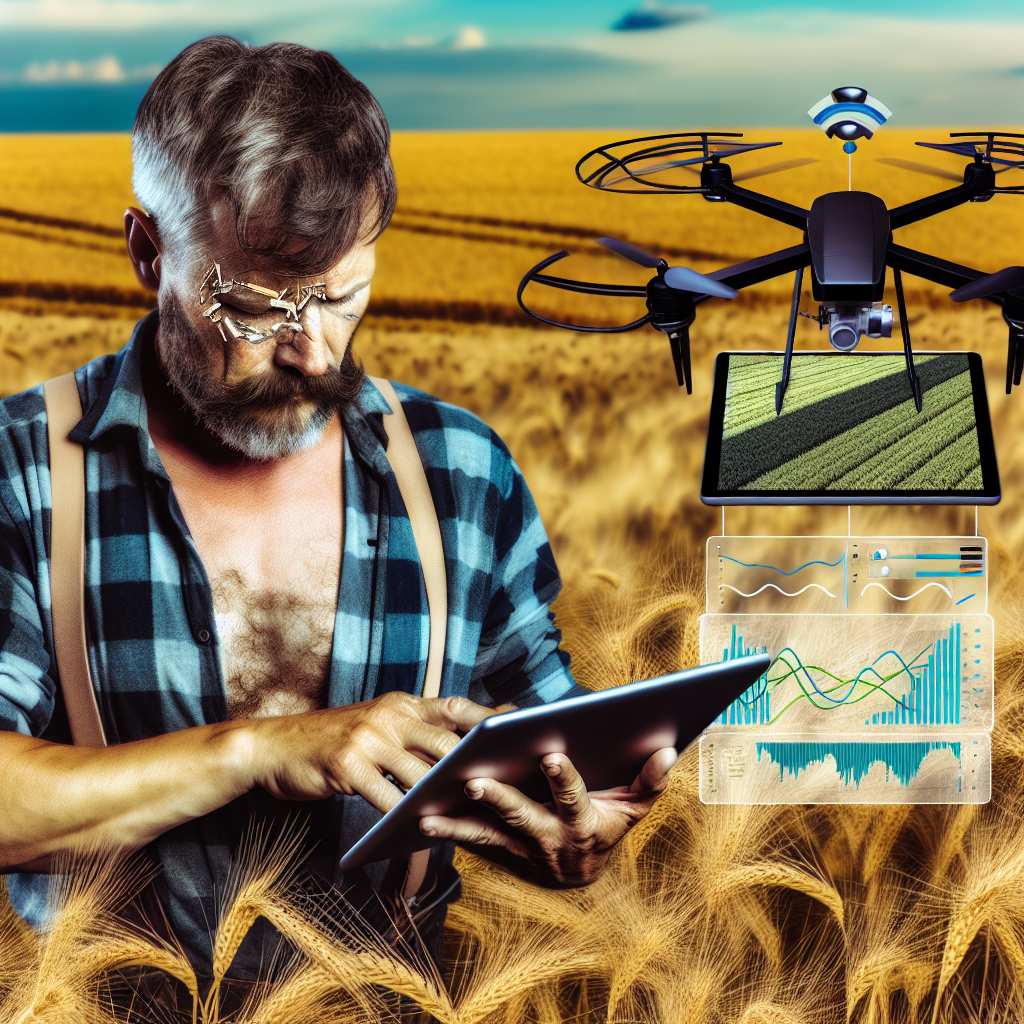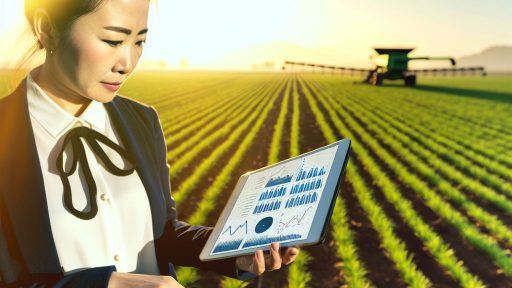Introduction to Agri-Fintech
Agri-fintech combines agriculture and technology to enhance farming.
This sector simplifies financial processes in agriculture.
Modern farmers benefit from integrated financial solutions.
They can manage resources more effectively, reducing waste.
Data-driven insights help farmers make informed decisions.
Defining the Landscape
The agri-fintech landscape includes various innovative tools.
These tools range from apps to online platforms and services.
Farmers leverage these resources to improve efficiency.
For instance, they can track expenses and revenues easily.
Importance for Modern Farmers
Today’s farmers face numerous challenges, including climate change.
Agri-fintech addresses many of these challenges directly.
Farmers gain access to affordable credit options through digital means.
This access enhances their ability to grow and sustain businesses.
Moreover, technology streamlines supply chain management.
As a result, farmers can respond quickly to market demands.
Transform Your Agribusiness
Unlock your farm's potential with expert advice tailored to your needs. Get actionable steps that drive real results.
Get StartedIn addition, the use of analytics fosters better resource allocation.
Therefore, adopting agri-fintech tools is essential for success.
Smart Farming
Overview of Precision Agriculture
Precision agriculture focuses on optimizing field-level management.
This approach uses detailed information about variability in crops.
Farmers collect data on soil health, moisture levels, and crop performance.
Consequently, they can make informed decisions for improved yields.
Furthermore, precision agriculture utilizes advanced technologies.
These technologies include GPS, IoT sensors, and data analytics.
As a result, farmers can monitor their fields in real-time.
This constant monitoring helps in addressing issues promptly.
Role in Increasing Efficiency
Precision agriculture significantly enhances operational efficiency.
It reduces resource wastage by applying inputs only when needed.
For instance, farmers can accurately apply fertilizers and pesticides.
This targeted application leads to cost savings over time.
Moreover, it decreases the environmental impact of farming.
By using fewer chemicals, farmers contribute to healthier ecosystems.
Benefits for Modern Farmers
Modern farmers reap numerous benefits from precision agriculture.
First, they experience improved crop yields year after year.
Second, they attain better quality produce, meeting market demands.
Third, the efficiency gained leads to increased profitability.
Additionally, farmers can make data-driven decisions.
This empowers them to adopt best practices tailored to their fields.
Tools and Technologies
Several tools support precision agriculture practices.
- GPS technology allows accurate field mapping.
- IoT sensors facilitate real-time soil and crop monitoring.
- Drones provide aerial imagery for assessing crop health.
- Farm management software centralizes data handling.
- Data analytics platforms help forecast trends and outcomes.
Future of Precision Agriculture
The future of precision agriculture looks promising.
Showcase Your Farming Business
Publish your professional farming services profile on our blog for a one-time fee of $200 and reach a dedicated audience of farmers and agribusiness owners.
Publish Your ProfileEmerging technologies will further enhance capabilities.
For example, artificial intelligence will improve data analysis.
Moreover, the integration of robotics may streamline farming operations.
Farmers adopting these techniques position themselves for success.
Financial Management Tools
Overview of Financial Management Tools
Financial management tools are essential for modern farmers.
They help in budgeting and expense tracking.
Consequently, these tools enhance financial decision-making.
Farmers can monitor their expenses in real time.
As a result, they can make informed choices based on data.
Benefits of Using Financial Management Software
Using financial management software streamlines financial tasks.
Moreover, it reduces the time spent on bookkeeping.
This software improves accuracy in financial reporting.
Farmers gain visibility into their financial health.
Furthermore, they can forecast future financial performance.
Popular Financial Management Software Options
- AgLeader: This tool offers comprehensive budgeting features.
- FarmLogs: It enables efficient tracking of expenses and revenues.
- QuickBooks: Known for its user-friendly interface and reporting capabilities.
- Croptracker: Aimed specifically at crop planning and financial tracking.
Important Features to Consider
Selecting the right tool involves understanding its features.
Budgeting tools should provide flexible templates for farmers.
Expense tracking should be straightforward and easy to use.
Additionally, reporting capabilities should offer detailed insights.
Compatibility with mobile devices can enhance accessibility.
Integrating Tools with Existing Systems
Farmers should consider tools that integrate well with other systems.
This integration facilitates better data flow and organization.
Moreover, it reduces duplication of efforts in data entry.
Farmers can benefit from cloud-based solutions for convenience.
Lastly, training resources are crucial for smooth adoption.
Gain More Insights: Emerging Agri-Fintech Trends Every Farmer Should Embrace
Market Access Platforms
Connecting Farmers with Buyers
Digital marketplaces play a vital role in today’s agricultural landscape.
They bridge the gap between farmers and potential buyers.
Farmers can showcase their products to a broader audience.
Moreover, buyers benefit from accessing fresh, local produce.
The Role of Technology in Market Access
Advanced technology enhances the efficiency of market access platforms.
These platforms often feature user-friendly interfaces.
Farmers can easily upload listings and manage inventory.
In addition, real-time data allows for informed pricing decisions.
Benefits of Digital Marketplaces
Digital marketplaces offer multiple benefits for farmers.
- Increased visibility of products increases sales opportunities.
- Lower transportation costs result from localized selling.
- Access to customer feedback can improve product quality.
- Easier market analysis enables adapting to consumer trends.
Successful Platforms in the Agri-Fintech Space
Several platforms have gained traction within the agri-fintech ecosystem.
Farmers’ Market Connect offers a seamless interface for local sales.
AgriBiz Exchange connects producers with retailers efficiently.
Additionally, CropLink includes features for supply chain transparency.
Challenges and Considerations
While digital marketplaces provide great opportunities, challenges exist.
Limited access to technology can hinder some farmers.
Showcase Your Farming Business
Publish your professional farming services profile on our blog for a one-time fee of $200 and reach a dedicated audience of farmers and agribusiness owners.
Publish Your ProfileMoreover, trust between buyers and sellers needs to be established.
Ensuring data privacy is another critical concern for users.
Growth Potential for Future Platforms
The potential for growth in digital market access is significant.
As technology evolves, new features will enhance user experience.
Artificial intelligence could personalize buyer-seller interactions.
Furthermore, integrating blockchain may ensure transaction security.
Delve into the Subject: Wind Turbines Installation Best Practices for Farms
Supply Chain Management
Technology for Streamlining Logistics
Modern agriculture depends on effective logistics management.
Farmers can enhance efficiency through advanced logistics software.
Such tools simplify scheduling, transporting, and tracking goods.
Integrating these technologies reduces delays and costs.
Inventory Management Solutions
Effective inventory management is crucial for farmers.
Farmers can use software to track stock levels in real time.
This ensures that essential supplies are always available.
Additionally, accurate inventory records help prevent waste.
Data Analytics for Better Decision-Making
Data analytics plays a vital role in modern farming.
Farmers can analyze trends to make informed choices.
This helps optimize production and resource allocation.
Utilizing data leads to smarter, more sustainable farming practices.
Collaboration Tools for Enhanced Communication
Effective communication among stakeholders is essential.
Collaboration tools facilitate seamless interaction across the supply chain.
Farmers, suppliers, and distributors can share critical insights quickly.
This enhances coordination and improves overall efficiency.
See Related Content: How Agri-Fintech Solutions Are Revolutionizing Modern Farming Practices

Data Analytics: Using Big Data to Forecast Trends and Improve Decision Making
The Importance of Data Analytics in Agriculture
Data analytics plays a critical role in modern farming.
By leveraging big data, farmers can enhance their decision-making process.
This capability allows for better forecasting of weather, crop yields, and market trends.
Gathering Data: Sources and Methods
Modern farmers utilize various data sources to inform their practices.
Satellite imagery offers insights into land usage and crop health.
Farm management software collects data on field operations, labor, and input usage.
Additionally, sensors in the field provide real-time information on soil moisture and nutrients.
Analyzing Data: Tools and Techniques
Farmers use specialized tools to analyze the data they collect.
For instance, machine learning algorithms help identify patterns in historical data.
Predictive analytics models provide forecasts related to environmental conditions.
Data visualization software makes it easier to interpret these complex datasets.
Benefits of Data-Driven Decision Making
Data-driven decisions lead to more efficient resource management.
Farmers can optimize planting and harvesting schedules based on reliable forecasts.
Moreover, targeted marketing strategies increase profitability.
Efficiency in operations ultimately enhances sustainability and reduces waste.
Real-World Applications
Several farming pioneers illustrate the benefits of data analytics.
Showcase Your Farming Business
Publish your professional farming services profile on our blog for a one-time fee of $200 and reach a dedicated audience of farmers and agribusiness owners.
Publish Your ProfileMaria Gonzales uses data to determine the best crop rotations for her farm.
Jake Thompson relies on analytics to predict sales trends for his produce.
These examples showcase how data analytics transforms agricultural practices.
Future of Data Analytics in Agriculture
The future of agriculture lies in continued innovation in data analytics.
Advancements in artificial intelligence will likely enhance predictive capabilities.
As technology evolves, farmers will adopt even more sophisticated tools.
Embracing these changes can lead to an agricultural revolution.
Discover More: How Biotechnology Is Transforming Modern Farming Practices
Mobile Applications: The Role of Apps in Empowering Farmers for On-the-Go Management
Enhancing Farm Management
Mobile applications offer real-time data to farmers.
This data facilitates informed decision-making regarding crops.
Farmers can monitor weather and soil conditions directly on their devices.
Additionally, these apps provide insights into pest management and treatment options.
Improving Financial Management
Many apps help farmers manage their finances efficiently.
They allow users to track expenses and income seamlessly.
Farmers can generate reports to analyze profitability effectively.
Moreover, these financial tools often include budgeting features.
Streamlining Supply Chain Management
Mobile applications help in streamlining supply chain processes.
Farmers can easily track inventory levels and identify shortages.
This tracking promotes timely ordering of supplies.
Furthermore, apps can connect farmers with local and regional markets.
Facilitating Communication and Networking
Effective communication is vital in modern farming.
Mobile apps allow farmers to connect with peers and experts easily.
Farmers can share experiences and solutions to common challenges.
Networking through apps can lead to collaboration and partnerships.
Utilizing Precision Agriculture Tools
Precision agriculture apps enhance farming efficiency.
These apps analyze data collected from various sources.
Farmers can optimize their use of resources like water and fertilizers.
This optimization increases both yield and sustainability.
Compliance and Risk Management
Importance of Compliance
Compliance is essential in modern agriculture.
It ensures that farmers adhere to regulations.
Regulations can vary greatly by region and crop type.
Understanding these regulations is crucial for success.
Non-compliance can lead to fines and legal issues.
Risk Management Strategies
Effective risk management strategies are necessary for modern farmers.
These strategies help mitigate both financial and operational risks.
They allow farmers to anticipate potential challenges.
Risk management helps protect crops against unforeseen events.
Insurance is a vital tool in managing agricultural risks.
Recommended Tools for Compliance
Farmers can use digital tools to manage compliance processes.
Compliance management software simplifies record-keeping.
Showcase Your Farming Business
Publish your professional farming services profile on our blog for a one-time fee of $200 and reach a dedicated audience of farmers and agribusiness owners.
Publish Your ProfileThese tools provide alerts for compliance deadlines.
They also track regulatory changes automatically.
- AgriSecure offers comprehensive compliance solutions.
- FarmLogs provides detailed record-keeping features.
- CropWise helps monitor regulatory changes in real time.
Implementing Risk Assessment Tools
Farmers should implement regular risk assessments.
Risk assessment tools evaluate potential threats to operations.
These assessments identify vulnerabilities in farming practices.
Additionally, they can forecast financial impacts.
- Agricultural Risk Systems offers detailed analysis models.
- AgriRisk helps in developing risk management plans.
- FarmRisk provides insights into market volatility.
Continuous Education and Training
Continuous education is vital for staying compliant.
Farmers should participate in workshops and training sessions.
These opportunities enhance knowledge on regulations.
Education also fosters resilience against emerging risks.
Networking with industry experts can provide valuable insights.




